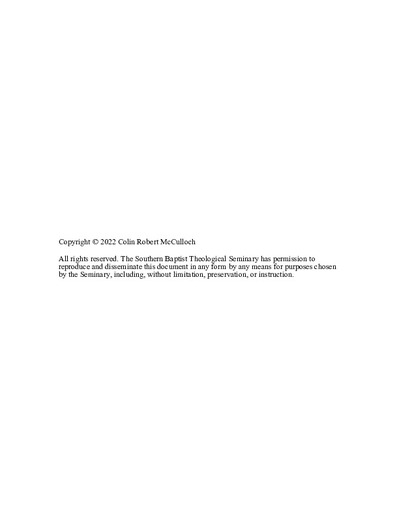Sanctified by the Spirit: Applying John Owen's Concept of Spirit-Infused Habitual Grace to Divergent Models of Sanctification within the Biblical Counseling Movement
Subject
Owen, John, 1616-1683Adams, Jay E., 1929-
Powlison, David, 1949-
Sanctification
Holy Spirit
Grace (Theology)
Counseling--Religious aspects--Christianity
Abstract
In this dissertation I argue that John Owen’s (1616–1883) conception of Spirit–infused habitual grace appropriately corrects and develops two divergent frameworks for understanding sanctification within the biblical counseling movement. Owen portrayed Spirit-infused habitual grace as the internal, metaphysical work whereby God sanctifies his people and conforms them to the image of Christ. He demonstrated that sanctification occurs by means of the Holy Spirit’s infusion of a habit—or principle—of grace in the soul of the believer at regeneration inclining them away from sin and toward righteousness, the Spirit’s increase of the operations of that habit of grace upon the faculties of the soul, and the Spirit’s bringing forth of the effects of that habit of grace through the bearing of the actual fruit of righteousness.Owen’s understanding of sanctification corrects and reconciles two divergent conceptions of sanctification that have developed among the first and second generation of biblical counselors. The first, represented by Jay Adams (1929–2020) and his followers, regards habituation as primary in bringing about human change, and the second, represented by David Powlison (1949–2019) and his followers, regards heart motivation as primary.
Chapter 1 offers an overview of the divergent models of sanctification that have developed within the biblical counseling movement. Chapters 2 through 4 each focus on an aspect of Owen’s overall theology that is key to understanding his theology of habituation and his doctrine of sanctification. Chapter 2 grounds Owen’s doctrine of sanctification in the doctrine of God, specifically his understanding of inseparable operations and divine appropriations. Chapter 3 discusses Owen’s doctrine of sanctification with regard to his Christology. He viewed Christ as the paradigmatic example for the sanctification of his church. Chapter 4 discusses Owen’s doctrine of sanctification with reference to his anthropology. This chapter focuses on the Spirit’s work of infusing habitual grace in believers. Chapter 5 proposes specific theological and methodological developments and corrections for modern biblical counseling based upon my discussion of Owen’s theology of sanctification.

